#african linguistics
Text
First in the list of the Niger-Congo languages to be covered is Fula:
The speakers of this language played a vital part in the recent history of West Africa in the form of the Fulani Jihads, and in the following history of the region in resistance to colonialism. As with Hausa for obvious reasons the Fulbe languages have influences from Arabic, while as with the Hausa and the Yoruba the languages are spoken across multiple states in the region.
And as will be noted, the Fulani and the Hausa in particular have longer and more complex histories. Specifically, in this case, one intertwined enough that speakers of very different languages with different roots can and do converge with each other culturally.
#lightdancer comments on history#african history#black history month#west african history#african linguistics#fulbe language
3 notes
·
View notes
Text
Naming International POC Characters: Do Your Research.
This post is part of a double feature for the same ask. First check out Mod Colette's answer to OP's original question at: A Careful Balance: Portraying a Black Character's Relationship with their Hair. Below are notes on character naming from Mod Rina.
~ ~ ~
@writingraccoon said:
My character is black in a dungeons and dragons-like fantasy world. His name is Kazuki Haile (pronounced hay-lee), and his mother is this world's equivalent of Japanese, which is where his first name is from, while his father is this world's equivalent of Ethiopian, which is where his last name is from. He looks much more like his father, and has hair type 4a. [...]
Hold on a sec.
Haile (pronounced hay-lee), [...] [H]is father is this world’s equivalent of Ethiopian, which is where his last name is from.
OP, where did you get this name? Behindthename.com, perhaps?

Note how it says, “Submitted names are contributed by users of this website. Check marks indicate the level to which a name has been verified.” Do you see any check marks, OP?
What language is this, by the way? If we only count official languages, Ethiopia has 5: Afar, Amharic, Oromo, Somali, & Tigrinya. If we count everything native to that region? Over 90 languages. And I haven't even mentioned the dormant/extinct ones. Do you know which language this name comes from? Have you determined Kazuki’s father’s ethnic group, religion, and language(s)? Do you know just how ethnically diverse Ethiopia is?
~ ~ ~
To All Looking for Character Names on the Internet:
Skip the name aggregators and baby name lists. They often do not cite their sources, even if they’re pulling from credible ones, and often copy each other.
If you still wish to use a name website, find a second source that isn’t a name website.
Find at least one real life individual, living or dead, who has this given name or surname. Try Wikipedia’s lists of notable individuals under "List of [ethnicity] people." You can even try searching Facebook! Pay attention to when these people were born for chronological accuracy/believability.
Make sure you know the language the name comes from, and the ethnicity/culture/religion it’s associated with.
Make sure you understand the naming practices of that culture—how many names, where they come from, name order, and other conventions.
Make sure you have the correct pronunciation of the name. Don’t always trust Wikipedia or American pronunciation guides on Youtube. Try to find a native speaker or language lesson source, or review the phonology & orthography and parse out the string one phoneme at a time.
Suggestions for web sources:
Wikipedia! Look for: “List of [language] [masculine/feminine] given names,” “List of most common [language] family names,” “List of most common surnames in [continent],” and "List of [ethnicity] people."
Census data! Harder to find due to language barriers & what governments make public, but these can really nail period accuracy. This may sound obvious, but look at the year of the character's birth, not the year your story takes place.
Forums and Reddit. No really. Multicultural couples and expats will often ask around for what to name their children. There’s also r/namenerds, where so many folks have shared names in their language that they now have “International Name Threads.” These are all great first-hand sources for name connotations—what’s trendy vs. old-fashioned, preppy vs. nerdy, or classic vs. overused vs. obscure.
~ ~ ~
Luckily for OP, I got very curious and did some research. More on Ethiopian & Eritrean naming, plus mixed/intercultural naming and my recommendations for this character, under the cut. It's really interesting, I promise!
Ethiopian and Eritrean Naming Practices
Haile (IPA: /həjlə/ roughly “hy-luh.” Both a & e are /ə/, a central “uh” sound) is a phrase meaning “power of” in Ge’ez, sometimes known as Classical Ethiopic, which is an extinct/dormant Semitic language that is now used as a liturgical language in Ethiopian churches (think of how Latin & Sanskrit are used today). So it's a religious name, and was likely popularized by the regnal name of the last emperor of Ethiopia, Haile Selassie (“Power of the Trinity”). Ironically, for these reasons it is about as nationalistically “Ethiopian” as a name can get.
Haile is one of the most common “surnames” ever in Ethiopia and Eritrea. Why was that in quotes? Because Ethiopians and Eritreans don’t have surnames. Historically, when they needed to distinguish themselves from others with the same given name, they affixed their father’s given name, and then sometimes their grandfather’s. In modern Ethiopia and Eritrea, their given name is followed by a parent’s (usually father’s) name. First-generation diaspora abroad may solidify this name into a legal “surname” which is then consistently passed down to subsequent generations.
Intercultural Marriages and Naming
This means that Kazuki’s parents will have to figure out if there will be a “surname” going forward, and who it applies to. Your easiest and most likely option is that Kazuki’s dad would have chosen to make his second name (Kazuki’s grandpa’s name) the legal “surname.” The mom would have taken this name upon marriage, and Kazuki would inherit it also. Either moving abroad or the circumstances of the intercultural marriage would have motivated this. Thus “Haile” would be grandpa’s name, and Kazuki wouldn’t be taking his “surname” from his dad. This prevents the mom & Kazuki from having different “surnames.” But you will have to understand and explain where the names came from and the decisions dad made to get there. Otherwise, this will ring culturally hollow and indicate a lack of research.
Typically intercultural parents try to
come up with a first name that is pronounceable in both languages,
go with a name that is the dominant language of where they live, or
compromise and pick one parent’s language, depending on the circumstances.
Option 1 and possibly 3 requires figuring out which language is the father’s first language. Unfortunately, because of the aforementioned national ubiquity of Haile, you will have to start from scratch here and figure out his ethnic group, religion (most are Ethiopian Orthodox and some Sunni Muslim), and language(s).
But then again, writing these characters knowledgeably and respectfully also requires figuring out that information anyway.
~ ~ ~
Names and naming practices are so, so diverse. Do research into the culture and language before picking a name, and never go with only one source.
~ Mod Rina
#asks#language#languages#linguistics#east africa#african#immigration#ethiopian#names#naming#research#resources#writeblr#character names#character name ideas#rina says read under the cut. read it
4K notes
·
View notes
Text
Are there Black dialects of Spanish?

Some people got a surprising result after taking an MIT dialect quiz. It was meant to guess what U.S. dialect the test taker spoke and the person's native language. As results started coming in, many Spanish speakers saw their English dialect had been marked as “U.S. Black Vernacular/Ebonics”
But what's the connection between speaking Spanish and U.S. Black Vernacular?
In the United States, dialects spoken by African Americans are sometimes referred to as Black English, African American Vernacular English, or even Ebonics. Though the terms have had different levels of popularity, having a specific name at all has given African Americans the ability to reclaim their language practices as a joyous part of their identity.
But much less common are terms and discussions about Blackness and Black language beyond English. If Black English dialects exist, are there also Black forms of other languages due to colonization? For example, are there Black Spanishes and Black Portugueses, too? Read more here.
Source: Are there Black dialects of Spanish? by Aris M. Clemons
Visit www.attawellsummer.com/forthosebefore to learn more about Black history.
Need a freelance graphic designer or illustrator? Send me an email.
#black history#Afro-Latino#diaspora#African diaspora#dialects#linguistics#race#identity#language#Spanish#AAVE#ebonics#African American Vernacular English
106 notes
·
View notes
Text
There are 2,900 languages that are endangered. This means they have fewer than 10,000 speakers, and most of them are not being passed on to younger generations.
What Causes Language Extinction?
1. Colonization and oppression
2. Globalization and urbanization
3. Education and media
4. Attitudes and prestige
Why Does Language Extinction Matter?
1. Cultural heritage
2. Scientific knowledge
3. Linguistic diversity
How Can We Save Endangered Languages?
1. Documentation and revitalization
2. Policy and legislation
3. Awareness and advocacy
Places ranked by Endangered Languages
1. Africa with 619 languages
2. Asia with 613 languages
3. South America with 448 languages
4. North America with 182 languages
5. Pacific with 592 languages
6. Europe with 238 languages
7. Australia with 108 languages
#language#cultural heritage#endangered languages#historic preservation#anthropology#linguistics#asian#south america#african#language learning#native language
129 notes
·
View notes
Photo


Andries Coetzee
Gender: Male
Sexuality: Gay
DOB: N/A
Ethnicity: White - South African
Occupation: Linguist, professor
38 notes
·
View notes
Text
Bonus 80: Postcards from linguistics summer camp
What if there was a summer camp for linguists? Like, imagine you could just go somewhere for a few weeks or a month and do linguistics classes and go to linguistics talks and eat your meals with linguists all day every day? Well, this event exists, sort of, and they're called linguistics institutes.
In this bonus episode, Gretchen and Lauren get enthusiastic about Gretchen's visit to the 2023 LSA institute at University of Massachusetts Amherst this summer. We talk about cool projects that Gretchen learned about at this year's Lingstitute, including the Linguistic Atlas Project, the Oxford Dictionary of African American English, and the Wôpanâak Language Reclamation Project (talks about all of these projects are now available online). We also talk about the history of LSA summer institutes (the first one was in 1928, almost a hundred years ago!), why they're not to be confused with the Summer Institute of Linguistics (SIL), which is a missionary project for Bible translation (awkward), and both Gretchen's history attending various institutes and Lauren's history not attending them (sorry about the FOMO though).
Listen to this episode about linguistics summer camp and get access to many more bonus episodes by supporting Lingthusiasm on Patreon.
#language#linguistics#lingthusiasm#lsa#lingstitute#lsa institute#Oxford Dictionary of African American English#Linguistic Atlas Project#Wôpanâak Language Reclamation Project#linguistic summer camp
55 notes
·
View notes
Text
girls don’t want boys, girls want Xhosa for English speakers on Duolingo, launching October 2038
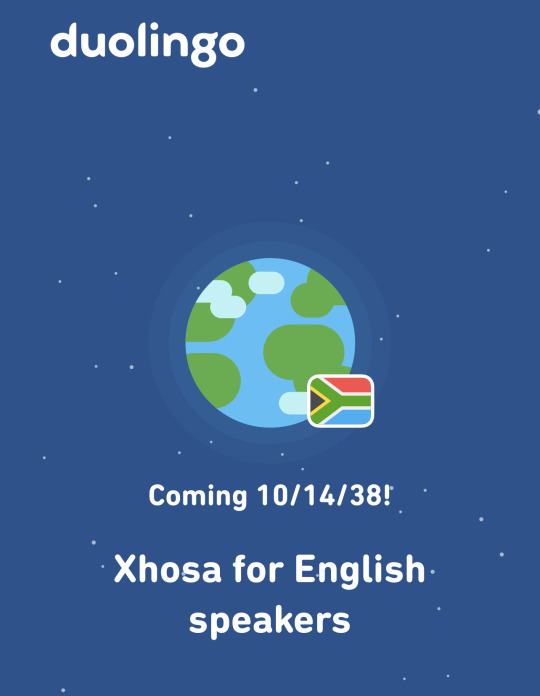
#duolingo#duolingo memes#xhosa#african languages#langblr#language#language blog#languageblr#language meme#language memes#linguistics#linguistics humor#language learning#english#linguistics memes#linguistics blog#lingblr#studyblr#language lover#lingblog#linguistics tumblr#languages#linguistics jokes
344 notes
·
View notes
Text
About Us
We create quality linguistic and cultural solutions for the human family.
Courses: our tailored and handcrafted courses enable you learn a wide variety of languages. We focus on non-European, minority, endangered, Indigenous and ancient languages. All courses are created by native speakers.
Our upcoming further solutions.
Get Involved
Subscribe to our official blog and always stay updated on our future projects.
Contribute: if you are a native speaker of another language, consider working with us craft a course and earn revenue from each sale.
Join our Affiliate Programme and help us promote multilingualism and intercultural understanding.
You can also save our multilingual playlist:
Learn more about us:
#languages#language learning#multilingual#polyglot#bilingual#language stuff#linguistics#language revival#indigenous languages#endangered languages#minority languages#ancient languages#asian languages#african languages#language lover#langblr#language study#foreign languages#learning languages#intercultural#global citizenship#multicultural#Spotify
2 notes
·
View notes
Text
also with these discussions comes discussions about AAVE and such, and it's such an interesting topic that I'm glad is being talked about but it annoys me to no end that it's trending NOW and being talked about NOW because white allies finally decided to put on their ally caps and discuss it, because it's only worth discussing when white people do it.
We been talking about this for EVERRR. like. Forever-ever. Blaccent, Code-switching, discrimination, music, whatever. It's only worth discussing when two black rappers are making a fool of themselves with their silly beef and white people deciding to have an intellectual debate and discussions about it.
Anways. AAVE is such an integral part of black existence and community, actually. I grew up with my father code-switching and my aunties and granny teaching me different words. And also growing up learning Michigan AAVE is different than Ohio or Georgia or California AAVE. Because there are regional dialects. Growing up learning to not talk like that because my white family don't know how to be normal about minorities. Growing up seeing my cousin's being demonized for their "ghetto" and "hood", accents but Awkwafina making a whole career from basterdizing our culture, much like Elvis before her. I'm not a professional or anything, I didn't study it, but I do live it.
Idk, it just. Is interesting. I've also decided I'm gonna stop code switching for Tumblr. Y'all don't deserve my customer service voice. Y'all think Hamilton counts as rap.
2 notes
·
View notes
Text
A dictionary of African American English
Oxford University Press is publishing a dictionary of African American English!
"The dictionary will not just collect spellings and definitions. It will also create a historical record and serve as a tribute to the people behind the words." ~ Henry Louis Gates, Director of the Hutchins Center for African and African American Research at Harvard University
The project is a collaboration between Oxford University Press and the Hutchins Center for African and African American Research at Harvard University, headed by Henry Louis Gates.
#dialect#lexicography#African American English#Black English#Black#Ebonics#linguistics#language#words#grammar
93 notes
·
View notes
Text
Next is Yoruba:
And this particular language, of course, has multiple aspects to differentiate it. Not only does it preserve the most well-known traditional African polytheistic religion in the most detail, the one that's ancestral to a whole trans-Atlantic religious complex in its own right but it's one of the main languages used by the state of Nigeria to get around the diversity of the big languages and the smaller one.
Not least for the ancestry it and the state and cultural traditions it spawned offer to the broader Black diaspora Yoruba stands as one of the most important languages in the region at a global level. Hausa may be the one with the largest number of speakers but Yoruba and the Yoruba people have the largest impact.
#lightdancer comments on history#black history month#african history#african linguistics#yoruba language
2 notes
·
View notes
Text
Zambia 🇿🇲:
In Zambia, as well as some other African nations (including my own), you can find humongous termite mounds the size of a small house, in a multitude of different shapes. Some of these mounds are used by the termites for hundreds of years, with one mound dated to be around 4000 years old.
Such clever little engineers!
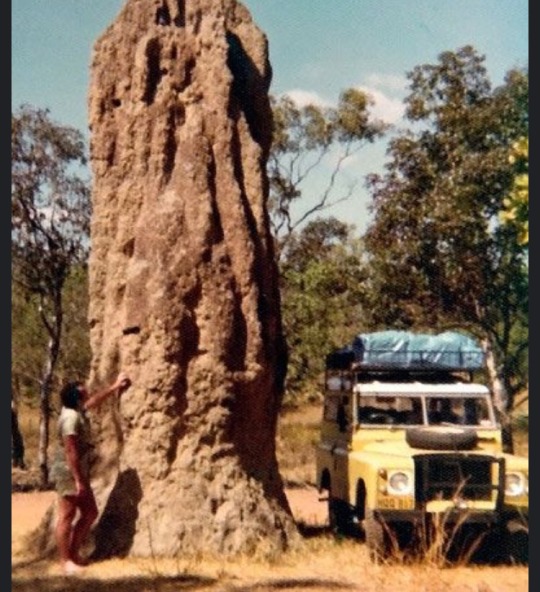
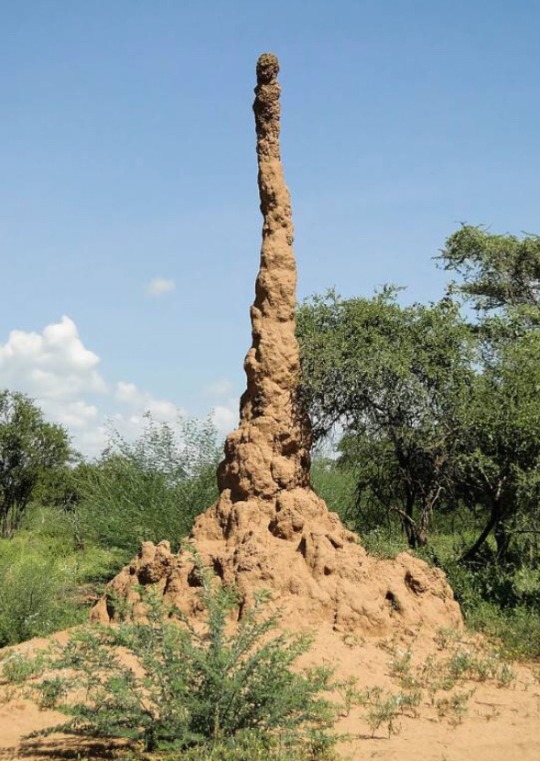
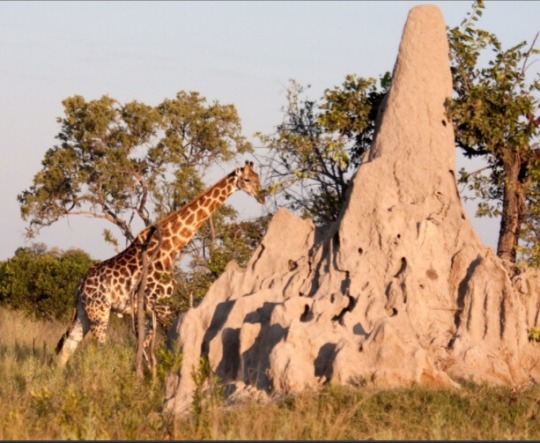
In my completely unrelated opinion, Zambia also boasts some really delicious cuisine.
#Zambia#such a cool country actually#it’s southern African but it’s sort of in the crossroads between east south and central#consequently it’s extremely linguistically and culturally diverse#africa#🇿🇲#fun facts#termites#bug facts#Southern Africa
5 notes
·
View notes
Text
also; I would like to point out 1) I am a fairer-skinned coloured person and 2) the same thing happens with setswana. My family are from the kraal and the 'hick' setswana we spoke got seen as a lesser form of setswana.
My siblings and I spoke setswinglish (a mix of setswana and English, on account of going to an English medium school and speaking both languages at home) and the people who tended to get up in arms about it being 'broken English' were expat English teachers at the school and older mixed race people from middle class backgrounds who'd been brought up speaking primarily English at home.
Unfortunately even within cultures of origin for creole and blended languages, classism, colourism and language are linked. It's not an issue unique to South Africa, and I apologise if it came across that way in my response to Lilly's post.
8 notes
·
View notes
Link
3 notes
·
View notes
Text
Today's nerdy thought nobody asked for because linguistics/acoustics are an autistic hyperfixation of mine:
How much of the phonetic structure and musical composition of ancient hominid species has it's bare-bones roots in mimicry of indigenous wildlife? Did our ancestors really build forms of communication and auditory arts from the ground up, or did they borrow primordial lend-words from our fellow living creatures and go from there?
Basically are we the decendants of parrots in primate bodies?
#*cue Diogenes entering with a freshly plucked african grey parrot and the intent to end my whole career*#shaddap taurus#linguistics#acoustics#science
2 notes
·
View notes
Text
The mind-boggling complexities of Africa's 1,500 languages were clarified by Stanford University's great linguist Joseph Greenberg, who recognized that all those languages fall into just five families (see Figure 19.2 for their distribution). Readers accustomed to thinking of linguistics as dull and technical may be surprised to learn what fascinating contributions Figure 19.2 makes to our understanding of African history. (...) Concealed at the top of Figure 19.2 is our first surprise, a big shock for Eurocentric believers in the superiority of so-called Western civilization.
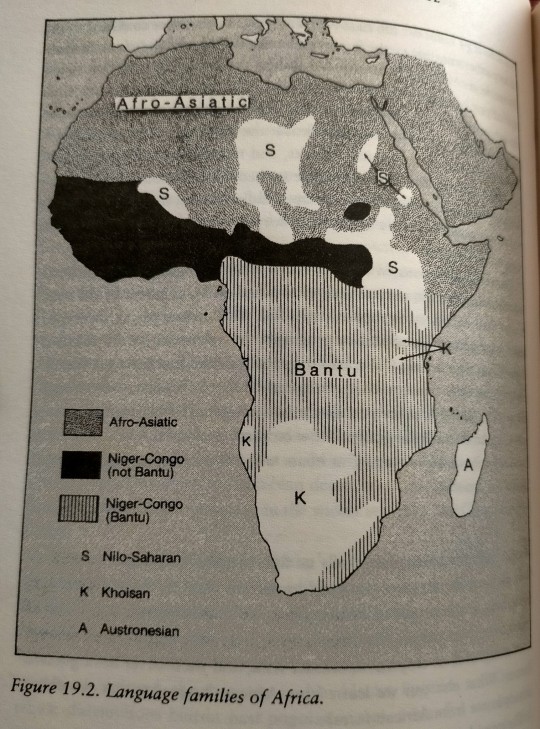
The next surprise in Figure 19.2 is a seeming detail on which I didn't comment when I just told you that distinct peoples tend to have distinct languages. (...) The fragmented distribution of Nilo-Saharan languages in Figure 19.2 similarly implies that many speakers of those languages have been engulfed by speakers of Afroasiatic or Niger-Congo languages. (...) If you look again at Figure 19.2, you'll see that the Niger-Congo language family is distributed all over West Africa and most of subequatorial Africa, apparently giving no clue as to where within that enormous range the family originated.
"Guns, Germs and Steel: A Short History of Everybody for the Last 13,000 Years" - Jared Diamond
#book quotes#guns germs and steel#jared diamond#nonfiction#language#stanford university#joseph greenberg#linguistics#african history#bantu#niger congo#afroasiatic#african languages
3 notes
·
View notes